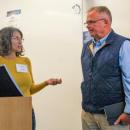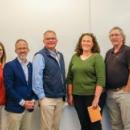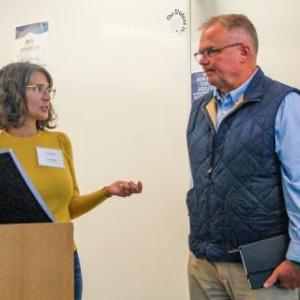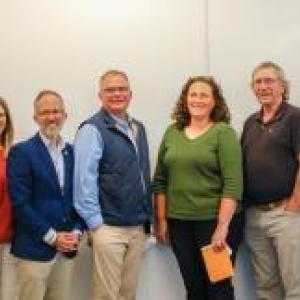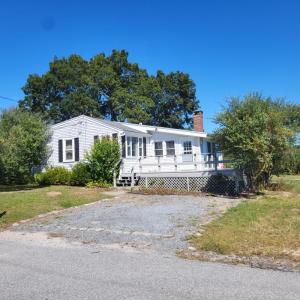Changing tides: Shellfishing solutions presented at summit
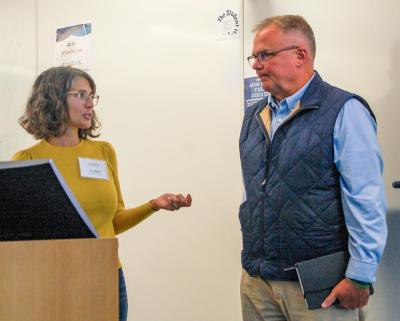 Liz Wiley, director of the Marion Institute, moderates the discuss with Representative Chris Markey. Photos by Mari Huglin
Liz Wiley, director of the Marion Institute, moderates the discuss with Representative Chris Markey. Photos by Mari Huglin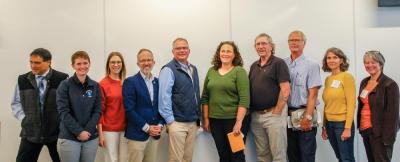 All speakers and representatives present at the summit. (From left to right): Vincent Furtado, Audra Riding, Jen Downing, Mark Sylvia, Chris Markey, Susan Murray, Dale Leavitt, Seth Garfield, Liz Wiley and Christine Smith.
All speakers and representatives present at the summit. (From left to right): Vincent Furtado, Audra Riding, Jen Downing, Mark Sylvia, Chris Markey, Susan Murray, Dale Leavitt, Seth Garfield, Liz Wiley and Christine Smith.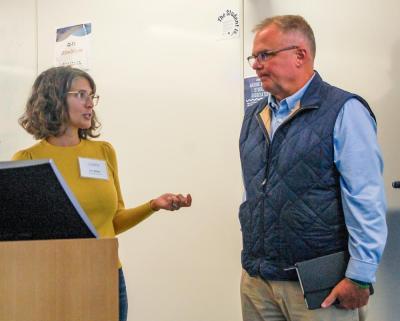 Liz Wiley, director of the Marion Institute, moderates the discuss with Representative Chris Markey. Photos by Mari Huglin
Liz Wiley, director of the Marion Institute, moderates the discuss with Representative Chris Markey. Photos by Mari Huglin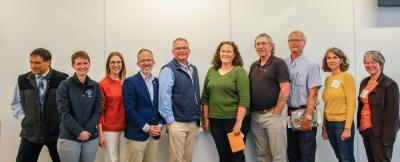 All speakers and representatives present at the summit. (From left to right): Vincent Furtado, Audra Riding, Jen Downing, Mark Sylvia, Chris Markey, Susan Murray, Dale Leavitt, Seth Garfield, Liz Wiley and Christine Smith.
All speakers and representatives present at the summit. (From left to right): Vincent Furtado, Audra Riding, Jen Downing, Mark Sylvia, Chris Markey, Susan Murray, Dale Leavitt, Seth Garfield, Liz Wiley and Christine Smith.NEW BEDFORD — Frustrated South Coast shellfish farmers continue to struggle with strict policies implemented by the FDA. Government representatives and local initiatives look to change the tide.
The Marion Institute’s fifth annual Food Policy Summit took place on Friday, Oct. 3 at the UMass Dartmouth School for Marine Science and Technology and addressed shellfishing and pollution of the South Coast waterways, specifically addressing New Bedford sewage systems.
The summit’s goal was to explain the direct impacts of combined sewage overflows on the shellfishing industry, explore the legislative goals and opportunities to solve issues and potentially launch a local coalition to support change.
Combined sewage overflows, also known as CSOs, occur when antiquated sewage systems become overwhelmed, usually after heavy rainfall. On the South Coast this means that waste can overflow into Buzzards Bay.
Shellfish beds can be contaminated with pollutants from a variety of sources including boats, runoff from roads and farms near the shore and naturally occurring bacteria outbreaks.
Seth Garfield, the board president of the Massachusetts Aquaculture Association, said Massachusetts shellfish farmers “produce about 50 million oysters a year and with a value of approximately 30 to 40 million dollars.”
Garfield said, “Even with new funding sources, it will take decades to complete the work of cleaning up the CSOs. Aquaculture can't wait for this to happen.”
The sewage can infect shellfish with “vibrio cholera” leading to possible illness after consumption.
Stricter U.S. Food and Drug Administration policies have also shut farming operations down after these overflows happen, with farmers unable to harvest shellfish for at least 21 days.
For a medium length solution, farmers want to collect more data during combined sewage overflow events quicker. Right now water samples can only be analyzed a week after closures due to the labs being so far away.
The long term solution would be pleading with the FDA to loosen restrictions and finding other monetary solutions outside of taxes to update sewage systems.
State legislators explained a new bill that proposes the creation of a Coastal Waters Wastewater Financing Committee.
This committee would be tasked with identifying revenue sources to fund essential wastewater infrastructure improvements.
Rep. Christopher Markey said that finding support and lobbying is crucial to create change.
“If we get that out there and we educate not only the administration but also the other legislators and everyone in the state, I think we'll be much more successful,” he said.













